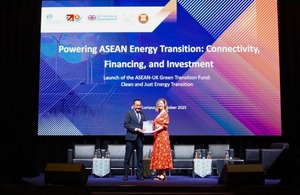Government launches major ‘Back British’ consultation to ensure defence spending drives UK jobs, skills and investment…reports Asian Lite News
British businesses, workers and communities are set to gain from a new government drive to “Back British” industry and ensure defence investment strengthens the domestic economy.
The government has unveiled plans for a wide-ranging consultation with industry on a new “Back British” offset policy aimed at guaranteeing that defence imports deliver tangible benefits for UK firms, jobs and innovation.
Under the proposed framework, when the UK procures equipment or services from international partners, the winning contractor would be obliged to generate jobs, transfer expertise and channel investment into Britain. This could include locating manufacturing facilities in the UK, using British small firms in supply chains, or supporting domestic skills development as a condition of securing the contract.
Minister for Defence Readiness and Industry, Luke Pollard, launched the consultation on Wednesday at the inaugural Defence Procurement Research, Technology and Exportability (DPRTE) Summit in Manchester, which was attended by more than 500 small and medium-sized enterprises (SMEs).
The 12-week consultation will shape the final version of the offset framework, ensuring it works effectively for UK businesses while maintaining close partnerships with global allies. The move delivers on the ambitions set out in the government’s Strategic Defence Review to build a stronger relationship with industry and overhaul defence procurement to drive jobs, growth and opportunity across the country.
Pollard said small businesses were central to the plan. “Small businesses are the backbone of our economy. We are increasing defence spending and directing more of that at UK-based firms. Where we have to buy from foreign firms a new offset approach means UK SMEs will benefit from offset agreements,” he said. “By helping open up global supply chains to UK firms of all sizes, a new offset approach will strengthen our Armed Forces while making defence an engine for growth across Britain.”
The initiative is part of the wider Defence Industrial Strategy, which seeks to ensure that national security investments also deliver economic value. The new offset consultation complements other reforms, including the establishment of a Defence Office for Small Business Growth, due to open early next year. The new office will offer tailored support to smaller suppliers looking to engage with the defence sector.
The government has also appointed a new National Armaments Director, Rupert Pearce, to strengthen collaboration with industry and help expand the UK’s manufacturing and innovation capacity to support Armed Forces readiness.
Pollard used the Manchester summit to announce an additional initiative designed to foster innovation in the North West. The National Cyber Force will lead a new accelerator programme for technology start-ups in the region, providing participants with mentorship, resilience training, co-working spaces, product development support and guidance on scaling operations. Four start-ups have been selected for the North West Cyber Accelerate programme, with activities taking place in Lancaster, Manchester and Preston.
Rupert Pearce, the newly appointed National Armaments Director, welcomed the consultation. “It’s been excellent to join the Minister at the DPRTE Summit in Manchester and meet with so many businesses, including SMEs, who are vital to strengthening our industrial base and the readiness of our armed forces,” he said. “The ‘Back British’ consultation demonstrates our commitment to ensuring defence investment creates opportunities for UK businesses across all regions, and I look forward to working with industry to deliver on this ambition.”
Following the summit, Pollard and Pearce visited key industrial and academic sites in the North West. Their itinerary included BAE Systems’ Samlesbury facility, where F-35 fighter jets are built, and the Typhoon final production line at Warton. They also toured the University of Central Lancashire’s innovation hub for air and space technologies, Altitude, where they met students and held discussions with SMEs and industry partners organised by the North West Regional Defence and Security Cluster—a collaboration between government, academia and industry aimed at bolstering the region’s defence and security capabilities.
Industry leaders welcomed the consultation as a positive step towards harnessing defence spending for wider economic benefit.
Kevin Craven, Chief Executive of ADS, said: “Offset agreements have the potential to be a powerful tool, not only ensuring our Armed Forces get the right equipment, but also unlocking opportunities for all UK businesses from the very smallest to scale, export, and invest. We warmly welcome the government’s recognition that industry must be at the heart of shaping this policy. For these agreements to succeed, they must be built on a foundation of supply chain resilience, ensuring our defence workforce remains secure, our industrial base stays strong, and our national capability delivers maximum value for the taxpayer.”














